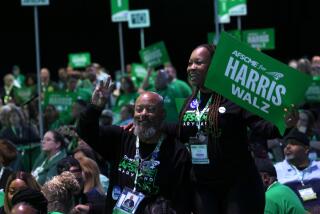Majority in the Survey Say Gays Should Not Be Barred From Serving in the Clergy
On an issue that has agonized mainline denominations and outraged religious traditionalists, a majority of San Fernando Valley residents say it is wrong to keep homosexuals out of the clergy.
In the most surprising finding of a mid-December survey of 1,237 adults, a Los Angeles Times Poll showed that 62% said it is wrong to exclude gays and lesbians from the pulpit while 24% think it is right.
Members of congregations also oppose the ban by a substantial margin, with 58% saying it is wrong to deny clergy status to homosexuals and 29% saying it is right.
Exclusion of gays is rejected even by many biblical fundamentalists; 45% would allow ordination and 39% would not.
“Quite a contradiction, isn’t it?” said Ed Doyle of Van Nuys, a poll respondent who believes in a literal interpretation of the Bible and opposes exclusion. “But they probably didn’t have the information in Bible days that we appear to have today. I think it’s an inherited thing, not something that homosexuals choose voluntarily. Predicated on that, I feel they should be included.”
For some, the biblical story of God destroying Sodom shows that homosexual acts are sinful.
“To have people who participate in those acts and then minister to other Christians, Catholics or Jews, it’s just not right,” said David McClure of Mission Hills. He said that he had a nominal Protestant upbringing but is now looking for a church.
But in another follow-up interview, a Mission Hills resident reflected the majority view.
“According to the Bible, homosexuality is wrong, but I listen to talk shows and know some gay people who say they were like that since childhood,” said Lori Martinez, who is studying with Jehovah’s Witnesses. “Gays are people too and could do a good job.”
Opposition to barring homosexual clergy is broad-based, shared by majorities of Roman Catholics, non-Catholic Christians, Jews and people who identify with no religion.
Of all the religions, the sentiment against exclusion was greatest among Jews. They said exclusion was wrong by 8 to 1. Reform Judaism voted in 1990 to admit gay and lesbian candidates to the rabbinate, but the other major branch of Judaism, the Conservative wing, only began formal debate on the question last year.
The Episcopal, Presbyterian and United Methodist national conventions have resisted proposals to admit gay and lesbian clergy, but this has not ended debate on the matter. Only the United Church of Christ among mainline denominations permits ordination of gays. Homosexuals also have been ordained in the Unitarian Universalist Assn.
Nationwide Gallup polls have shown a growing acceptance of homosexuals being clergy, but never by as much as 50%. A 1989 Gallup survey showed opinion evenly divided: 44% in favor of change and 43% against.
The Times poll suggests the Valley is more liberal on this question than the nation as a whole. But poll responses can be influenced by subtle differences in the wording of questions, experts say.
The Times question was: “Do you think it is right or wrong for gays and lesbians to be excluded from the clergy?” A nationwide poll for Time magazine and Cable News Network in June asked whether religious groups should allow “sexually active gays and lesbians” into the clergy: Only 36% said yes, and 53% said no.
But David Iverson of Burbank, who said gay clergy should be allowed, asked: “If the straight people can have sex, why can’t gays and lesbians too?”
And ex-Catholic Nadine White of San Fernando said, “I think if someone has a religious calling, they must think of God first, not of sex first.”
Shancy Pierce of Van Nuys, who was reared a Christian Scientist but is now a self-described “New Age” believer, said it is hypocritical to exclude homosexuals from the ministry since religions say God created all humans.
At the same time, Pierce thought that gay clergy would be inappropriate if they were “using religion as a way to expound activist views.”
More to Read
Sign up for Essential California
The most important California stories and recommendations in your inbox every morning.
You may occasionally receive promotional content from the Los Angeles Times.










